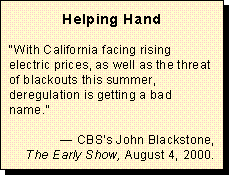 |
||||||||||||||||||||||||
|
||||||||||||||||||||||||
 |
||||||
|
||||||
 |
||||||||||||||||||
|
||||||||||||||||||
 |
|||||||||
|
 |
||||||||||||||||||||||||
|
||||||||||||||||||||||||
 |
||||||||||||||||||||||||
|
||||||||||||||||||||||||
|
What The Media Tell
Americans About Free Enterprise 
Journalists Try to Pull Out the Plug on Electricity Deregulation Business owners and residents in San Diego, California are understandably peeved that their electric bills have doubled over the past twelve months. But national media personalities have now parachuted in, blaming "deregulation" for consumersí woes when both past and present regulation of the electric power industry continues to affect market prices. "Like most consumers, Mike Hawkins took electricity for granted," Timeís Daniel Eisenberg wrote for the July 17 issue. "But when Hawkins got his bill in June from San Diego Gas & Electric (SDG&E), he was in a state of shock -- $135, nearly twice the previous amount."
In early August, when shortages forced some larger customers to cut their electricity consumption (Stage 2 emergencies), ABC and CBS said deregulation was responsible for the disruptions. "Deregulation was supposed to cut the cost of energy, but in recent months consumers across the nation are discovering otherwise, especially in California," asserted news anchor Jon Frankel on CBSís Early Show on August 4. "The bills are so high because the San Diego area is the first to experience Californiaís new electric deregulation law," similarly reported ABCís Dan Harris on the August 5 World News Tonight. These statements leave the impression that the buying and selling of electricity is unregulated, but thatís not really the case. Electricity is a difficult commodity to trade: demand must be immediately matched by supply, it canít be stored easily, and even brief interruptions in the supply can have profound consequences. That puts local power companies at a severe disadvantage when they need to go shopping for additional supplies from independent producers, who at times of peak consumption can charge extremely high rates to fill in gaps in the supply. Thatís why most states have put price ceilings on the cost of wholesale power; Californiaís is a low $250 per megawatt hour. Price caps ensure that power sellers canít charge outrageously high prices during times when supplies are tight, but differences in various state caps mean that electricity might flow to states with higher caps, where independent producers get a higher price. However necessary they might be to prevent extreme volatility, price limits, it should be pointed out, are a form of regulation, not deregulation. And, as GeoInvestor.comís editor William Kucewicz pointed out in an August 7 Wall Street Journal op-ed, SDG&Eís customers are unique in California in that local power companies in other jurisdictions are still required to give residences and small businesses reduced rates, in exchange for refinancing of "stranded costs" -- bad investments from the 1970s and 80s. Those bad investments (nuclear power plants, long-term purchase contracts, etc.) were a key reason that electricity prices in the 1990s were so far above actual production costs, a fact which stimulated the move towards deregulation in the first place. "San Diego Gas & Electric has already recovered its costs, thereby eliminating the mandated rate reduction, which is why its customers are receiving higher bills," Kucewicz explained. "Consumers elsewhere in the state [are] ... still enjoying the 10% rate reduction mandated by the 1996 deregulation law. This has exacerbated Californiaís woes, because these price controls offer no incentive to conserve energy." The most recent issue of Regulation magazine, published by the Cato Institute, discusses both the promise and problems of electricity deregulation in its cover stories. In one article, Severin Borenstein, the director of the University of Californiaís Energy Institute, and James Bushnell, the Energy Instituteís research director, cautioned that restructuring of the electric power industry must take into account the fact the need for continuous supply will give sellers a huge advantage in market power. "Given the enormous size of this industry," they wrote, "even small amounts of market power imply large transfers from consumers. This means that for consumers restructured electricity markets may be more costly in the short run than were their regulated predecessors. For restructuring to benefit consumers, the long-term gains stemming from improved investment decisions on both the demand and supply sides of the industry must be sufficient to outweigh the potential short-run costs." But the story that the media were telling in August 2000 was all about short-term pain, not about whether the state was moving smartly enough towards a genuine market system. "With California facing rising electric prices, as well as the threat of blackouts this summer, deregulation is getting a bad name," CBSís John Blackstone said on the August 4 Early Show. And some journalists were certainly doing their part.
Home | News Division
| Bozell Columns | CyberAlerts |
||||




 "The
culprit," Eisenberg flatly stated, "was deregulation."
"The
culprit," Eisenberg flatly stated, "was deregulation."